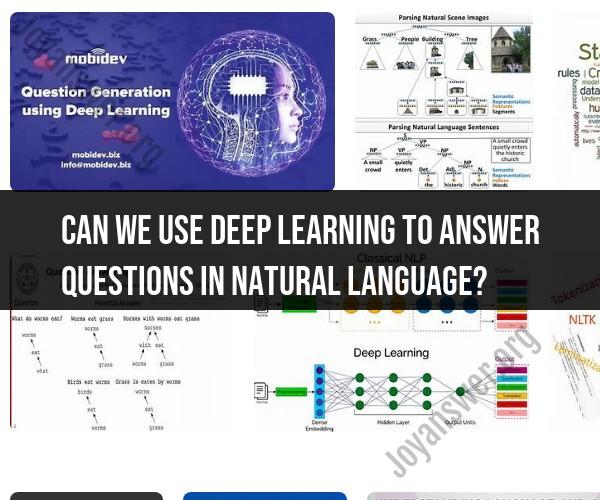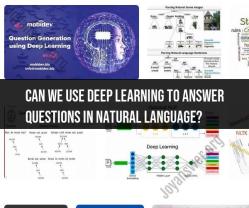Can we use deep learning to answer questions in natural language?
Yes, deep learning can be used to answer questions in natural language. Deep learning models, particularly those in the field of natural language processing (NLP), have made significant advancements in recent years and are capable of understanding and generating human-like responses to questions.
Here are some key components and approaches within deep learning that enable question answering in natural language:
Recurrent Neural Networks (RNNs): RNNs are a type of deep learning model that can process sequences of data, such as natural language text. They have been used in question answering tasks by modeling the sequential nature of language and context.
Long Short-Term Memory (LSTM) Networks: LSTMs are a type of RNN that is particularly effective at capturing long-range dependencies in sequences. They have been used in various NLP tasks, including question answering.
Transformer Models: Transformer-based architectures, such as BERT (Bidirectional Encoder Representations from Transformers) and GPT (Generative Pre-trained Transformer), have revolutionized NLP. These models are pre-trained on vast amounts of text data and can be fine-tuned for specific question answering tasks, achieving state-of-the-art results.
Question-Answering Datasets: Large question-answering datasets, like SQuAD (Stanford Question Answering Dataset) and TQA (Textbook Question Answering), have been instrumental in training and evaluating deep learning models for question answering. These datasets provide context and questions with associated answers.
Attention Mechanisms: Attention mechanisms, a fundamental component of transformer models, allow the model to focus on relevant parts of the input text when generating answers. This improves the model's ability to provide contextually relevant answers.
Memory Networks: Memory-augmented neural networks, such as Memory Networks and Neural Turing Machines, have been used for question answering tasks that involve reasoning over multiple pieces of information.
Transfer Learning: Pre-trained models can be fine-tuned on specific question-answering datasets or domains, enabling them to adapt to particular tasks and achieve high accuracy.
Ensemble Techniques: Combining multiple deep learning models or approaches, such as ensemble methods, can further improve question-answering performance.
Deep learning models for question answering are employed in various applications, including chatbots, virtual assistants, information retrieval systems, and more. They excel at understanding the context of a question and generating relevant responses based on the knowledge they have been trained on.
However, it's important to note that while deep learning has made significant strides in question answering, it is not without limitations. These models may sometimes produce incorrect or nonsensical answers, particularly when faced with questions that require common-sense reasoning or external world knowledge. Ongoing research in the field aims to address these challenges and further improve the accuracy and robustness of question-answering systems.
Deep Learning in Natural Language: Advancements in Question-Answering Systems
Deep learning has revolutionized the field of natural language processing (NLP), including question-answering (QA) systems. QA systems are designed to answer questions posed in natural language, and they are used in a variety of applications, such as search engines, chatbots, and virtual assistants.
Deep learning-based QA systems are able to achieve state-of-the-art results on a variety of QA benchmarks. They are able to understand the meaning of questions and answers, and they can generate answers that are both relevant and informative.
One of the key advantages of deep learning-based QA systems is that they are able to learn from data. This means that they can be improved over time by training them on new data. Additionally, deep learning-based QA systems are able to generalize to new data, which means that they can answer questions that they have never seen before.
AI and Language Processing: Leveraging Deep Learning for Question Answering
Deep learning is a type of artificial intelligence (AI) that is based on artificial neural networks. Neural networks are inspired by the human brain, and they are able to learn from data and to make predictions.
Deep learning has been shown to be very effective for a variety of NLP tasks, including QA. Deep learning-based QA systems are able to understand the meaning of questions and answers, and they can generate answers that are both relevant and informative.
Deep learning-based QA systems are used in a variety of applications, such as search engines, chatbots, and virtual assistants. For example, search engines use deep learning-based QA systems to provide more accurate and relevant search results. Chatbots use deep learning-based QA systems to answer questions posed by users in a natural and informative way. Virtual assistants use deep learning-based QA systems to provide users with information and to complete tasks.
Beyond Keywords: The Power of Deep Learning in Natural Language Question Answering
Traditional QA systems are based on keywords. This means that they match the words in the question to the words in the answer. However, this approach can be ineffective for answering complex questions or questions that require knowledge of the world.
Deep learning-based QA systems are able to go beyond keywords. They are able to understand the meaning of questions and answers, and they can generate answers that are both relevant and informative.
For example, if you ask a deep learning-based QA system the question "What is the capital of France?", it will be able to answer the question correctly, even though the word "capital" does not appear in the answer "Paris".
Deep learning-based QA systems are still under development, but they have the potential to revolutionize the way we interact with computers. They can be used to develop new and innovative applications that can help us to learn, to work, and to live our lives more effectively.


